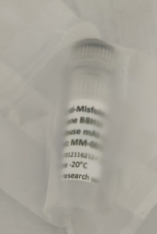 首页>
生物试剂
首页>
生物试剂
商家描述
产品评价(0)
Target
Hrs (HGS)
Target background
Hepatocyte growth factor-regulated tyrosine kinase substrate (HRS, also known as HGS) is a mammalian protein predominantly localized on early endosomes. Hrs interacts with many proteins involved in membrane trafficking, such as eps15, SNX-1 and SNAP-25. Hrs is implicated in early endosome fusion and may play a role in cargo sorting/trafficking to early and late endosome by recruiting clathrin. Hrs is also involved in intracellular signal transduction mediated by cytokines and growth factors.
Target alias
Hepatocyte growth factor-regulated tyrosine kinase substrate, HGS, Protein pp110
Immunogen
Full length hrs-2 fusion protein
Specificity
The antibody recognizes an epitope is located between the VHS and coiled-coil domain of the HRS protein
Clone ID
19-5
Isotype
IgG2b
Preservative
None
Format
Purified with protein G, stored in PBS pH 7.4 and lyophilized.
Recommend starting dilution
If reconstituted with deionized water in 50 µL: IHC: 1:300, ICC: 1:200, WB: 1:1000. Optimal dilution has to be determined by the user.
Limitations
Research Use Only
Storage
Lyophilized antibodies can be kept at 4ºC for up to 3 months and should be kept at -20ºC for long-term storage (2 years). To avoid freeze-thaw cycles, reconstituted antibodies should be aliquoted before freezing for long-term (1 year) storage (-80ºC) or kept at 4ºC for short-term usage (2 months). For maximum recovery of product, centrifuge the original vial prior to removing the cap. Further dilutions can be made with the assay buffer. After the maximum long-term storage period (2 years lyophilized or 1 year reconstituted) antibodies should be tested in your assay with a standard sample to verify if you have noticed any decrease in their efficacy. To limit antibody loss or degradation, BSA (final concentration 1%) and sodium azide (final concentration 0.02%) can be added to the suggested first dilution
 会员登录
会员登录.getTime()%>)
 购物车()
购物车()

 成功收藏产品
成功收藏产品